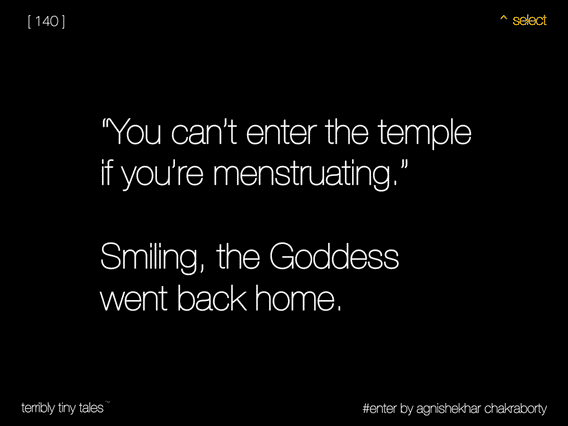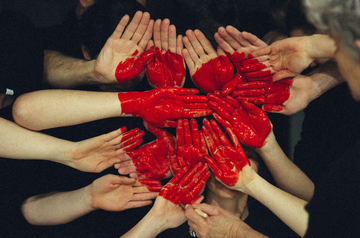Menstruation Is A Taboo But Not For Our SHEROES
Menstruation, like sex, has always been a taboo in our country. Thanks to a revolution that is helping us talk about periods openly, what with the #padman challenge and all. One of our community members shared this hard-hitting tiny tale and shared her views related to menstruation.

Nansi Mishra started talking on SHEROES community, “I am still not allowed to visit the temple when I am menstruating. Those learnings are so deep-rooted that I still think twice before watering my Tulsi plant. I still have thoughts before touching the pickle. I still don't worship when I am on my periods.
I do believe that they are wrong and I should no longer follow them. I am imagining my grandmother's face while writing this piece. What does your grandmother say?”
(Also Read: Why I can’t talk openly about periods?)
Shakun spoke up, “So initially my grandmother was not comfortable even with getting touched to a menstruating woman but gradually, around 3 not so easy to deal with granddaughters, she gave up. She allowed us to hug, eat, sit on her bed. Later she got so comfortable with it, as if that hitch never existed.
If you don't get over this, you'll pass on this sad behaviour pattern to the next generations, which would be a big burden to get over in this lifetime :)”
But Raji identified with Nansi, “I was born in a traditional Brahmin Iyer family. My grandmother used to live with us and she was very orthodox. We were made to sit in a separate room for three days, we would not be allowed to see her, we used to get food only after she had hers. Still, such practices exist in some Brahmin families.”
“Hi Raji, your story is totally relatable as I also belong to a typical Brahmin family. We were kids when we used to see our mother locked in a room for 3 days. We used to miss her but were not allowed to meet her 😢,” Nansi identified with Raji.
Rajlakshmi Pillai pitched in, “My MIL told me that during 'those days' you should not even look at the temple (we have a temple in our premises in Kerala). But I couldn't help it because your mind sends out prayers all the time and my God did not seem offended by it. Some beliefs can be tolerated, but I have read that in some parts of India, menstruating girls are made to stay in a hut, away from the village. That's horrible.”
Merril Diniz shared her take on this, “My grandmother was carefree and did not subscribe to any regressive ideas around menstruation. Having said that, it's not the same for other women. Strength to you Nansi. A mindset change is the first step!”
Yashashri is bringing about a change,
“I never followed those rules in my life and I’m teaching the same to my next generation. This is the only way to change this practice.”
Pallavy shared, “When I started menstruating, I was barely 10. I was kept in a separate room for a week, was not allowed to see any men - not even my father - and was married to a banana tree at the end of the week. I was too young to even know what was going on. Now when I think back, I realise how ridiculous that was.”
Fathima had a different opinion, “I haven't experienced any of this stuff personally but if you come to think of it, not all are mere superstitions. Women back in those days might not have had access to sanitary napkins and other menstrual hygiene necessities, so it would make sense to avoid entering the kitchen etc. But today, these practices have no relevance as we have access to greater menstrual hygiene than ever.”
Champa Roy enlightened us with this piece of information,
“Have you heard of Kamakhya Devi temple in Assam? It is said that Parvati 's genitals fell in this place and every year, the Goddess lets herself bleed in the month of July.”
“My mom used to tell all this but slowly, she changed all these rituals and I have not made my daughter follow any of this. I think we should be the one to come forward and change all this. Menstruation should be just like any other day for us,” expressed Nandita Sahni.
Nidhi Thawal spoke of facts, “Menstruation is a fact responsible for bringing life to this planet. How can it be impure to have a woman withdraw from entering a temple, touching a pickle and watering the tulsi? I fail and now even refuse to understand.
P.S: I have tried all of the above and nothing killed me 😁 Account your own self, not others, for they will always have their version to bog you down in some way or the other. From one woman to other! Love! 😘💓”
“First of all, you need to change and stop expecting others around you to change. You should be your normal self like on any other day and do all the chores and it is very important to ignore all the criticism and rude remarks made by people, no matter how close they are to us. It is important for them to see that menstruation doesn't change anything, in fact, it is a sign of good health,” reinstated Sayli Salaskar.
Pravitha Vijayan points out, “It is a part of our rooted culture. Nowadays also there are many people even highly educated who believe that we women are ‘polluted’ during those days. Even today, there are women who are not allowed to touch, cook and sleep in their rooms. Instead, they are given special plate and glass to eat and drink and special rooms which remain unattached to the main rooms to sleep. Even if some of us protest it, no one is going to change, as it is rooted in their mind, culture and tradition.
Reena Tallani had a separate angle, “It has to self-imbibe. It’s a matter of cleanliness, when you menstruate we are unhygienic, so we don't visit temples. We don’t dirty our house, then temples being sacred, it’s definitely a no.”
“My story and view on this are a bit different. Even I'm from an orthodox Brahmin family but my mom is cool and never asked us to follow such things, all my elder cousins used to follow. I have six cousins and all are married. A few of them have these restrictions and some don't. In the past, I used to hate such rules but now after seeing my sister's situation, I feel this is good (only in my case, as I suffer from a hell lot of pain and don't want to visit a temple or want people besides me or do any kind of work). Seems foolish, but it works for me well 😂 I never support it, neither oppose it in my case,” quips another woman.
Deepika Sharma opines,
“I have a different take on this, it's your belief, how you have adopted some rituals. But some people connect everything to women’s liberation and I don't think it is correct. What matters is how comfortable you feel in any setup.”
“During menstruation, a woman’s body gets immense power. Even temples are filled with holy vibrations and cannot bear these. That is the reason we are not allowed to do pooja or enter the temple because the vibrations from our body are so powerful during those days. Nothing bad about it. Therefore better not to do any rituals, pooja and visit temples and pilgrims centers for God’s sake,” feels Padmavathi Srinivasan.
Christy Matthews makes a point here, “Not questioning any religion but what we believe matters the most above anyone's teaching or advice. Menstruating is a normal biological process that happens in a woman, then how can it be regarded as impure, how can it be a sin? Even some elders ask us to not take holy communion at Church when we have periods, but then it doesn’t matter to me.
Faith and belief have nothing to do with our physical self or how we look or what is the colour of our skin. The inner feeling, how pure and righteous we are as a human being in terms of our emotions and thoughts matter - our deeds matter. Even my grandma says the same - believe in God almighty from your heart, pray to him and do what you feel is right do it.”
Namita Adur brought an interesting angle to the conversation, “Well the main aim behind restrictions for women to visit temples or eat/touch pickle or work in olden days was to let her rest. During menstruation, she loses a lot of blood and is very low on energy. In olden era, women used to work a lot like labor. They were the ones doing everything at home cleaning, cooking etc. All physically exhausting work and yet were determined to do it. For her to rest, the society gave it the name of being a sin so that she believes it and rests.
I don't think there would have been a better way than putting a superstition in those days. There was a scientific reason. Work can make her more stressed and exhausted. Women used to clean the temples, premises, made garlands etc. which is a physical task that can exhaust her. She wasn't allowed to touch anything or cook for the same reason.
About the pickle, her body already has a lot of heat generation during menstruation and pickle generates immense heat. Also, as there is hormonal imbalance during that time, many women tend to love sour food during menstruation. I would only say, society has got wrong beliefs now, there is nothing wrong with working or going in the kitchen or temple. The only intention is not to exhaust yourself.
When a Goddess is a woman, does it even make sense to think we are making a sin if we visit temple?
People need to think about it. Most importantly, it's up to you to believe first that there is nothing wrong with it, that's when others will understand too. And you don't really need to make them believe either, you believe and God will bless you.”
Every woman has a choice to follow what she believes in. What we loved about this conversation about menstruation are the different angles everybody brought in, not forcing them upon each other. That’s what a community is about, isn’t it?
More power to you ladies!
What is your opinion on taboos related to menstruation? Do you agree with the women here? Let us know in the comments below.
















